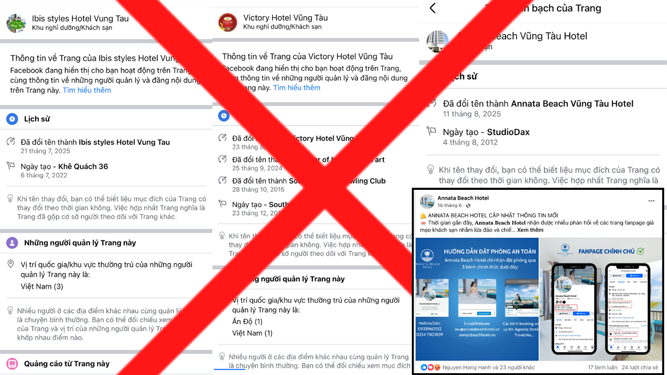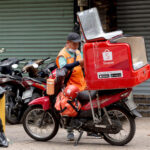A Surge of Hotel Booking Scams on Social Media Ahead of the September 2nd National Day Holiday
In the lead-up to the extended four-day National Day holiday on September 2nd, a wave of scams offering cheap hotel, resort, and entertainment bookings proliferated across social media platforms.
An Influx of Fake Fan Pages for Hotel Booking Scams
Ms. Minh Tâm from Đồng Nai Province fell victim to a scam after booking two rooms for her family’s holiday in Vũng Tàu through a fake fan page of a four-star hotel. The page, with tens of thousands of followers, featured luxurious images and attractive “discounted” room rates. She lost her deposit due to the deception.
According to Ms. Tâm, the fake hotel page responded swiftly, sending pictures of rooms and buffet menus. The scammer instructed her to transfer a 3 million VND deposit to secure the booking. Assuming that a large hotel wouldn’t deceive her, she made the transfer. It was only after reading a scam alert that she realized she had been conned.

Several fake fan pages have recently changed their names. Small image: A legitimate hotel posts a warning about their fan page being impersonated. Screenshot: TR.NGUYỄN
Mr. Thanh Hoàng from Ho Chi Minh City shared a similar experience. While searching for a hotel in Vũng Tàu for the National Day holiday, he came across a fan page advertising a four-star hotel for only 1.5 million VND per night. Suspicious of the offer, he messaged the page but was asked to make a 50% deposit, which raised his doubts. Most reputable hotels do not require deposits, especially when booking through well-known online travel platforms. He called the hotel’s official phone number and discovered that the fan page was indeed a scam.
Accommodation providers in Vũng Tàu confirmed that this scam recurs during peak travel seasons. A representative from Ngọc Hạnh Hotel on Thùy Vân Street revealed that their fan page has been frequently impersonated, with guests transferring significant amounts and only realizing they’ve been scammed when they arrive at the hotel. In some cases, scammers send fake links to gain control of victims’ phones and empty their bank accounts, with some losing up to 80 million VND.
Malibu Vũng Tàu Hotel also acknowledged receiving similar complaints and advised guests to book through reputable platforms or verify bookings by calling the hotel’s official phone number.
The sales director of a four-star hotel in Ho Chi Minh City shared her experience in a chat group with managers from other three- to five-star hotels in the area. She often heard stories of guests being scammed by fake fan pages. The scammers not only create convincing fan pages but also provide professional-looking invoices, booking confirmations, and payment instructions. They even impersonate the hotels’ bank accounts, making it challenging for guests to distinguish between the real and fake accounts.
This scam is not limited to Vũng Tàu. Popular tourist destinations like Đà Lạt, Nha Trang, Phan Thiết, and Ho Chi Minh City have also witnessed a surge in fake fan pages for four- and five-star resorts and hotels. These pages often feature more appealing content and designs than the legitimate pages. Some pages, despite having recently changed their names in July 2025, exhibit high engagement levels and even possess the coveted blue verification tick, misleading many into believing they are authentic. The scammers are highly responsive and professional in their interactions, typically requesting guests to transfer 30% to 50% of the room rate as a deposit and urging them to act fast to secure the discounted rates. Many fall prey to this pressure and transfer the money, only to discover the scam on the day of their arrival.
Exercise Caution When Booking
In response to these scams, many individuals have taken to travel groups on social media to warn others about fake fan pages offering suspiciously low prices. Meanwhile, some hotel managers are considering applying for the blue verification tick to instill confidence in potential guests, although there are concerns as some fake pages have also obtained this verification.
From a regulatory perspective, the authorities in Vũng Tàu advise tourists to book accommodations and services through official channels. It is best to contact the hotel or lodging facility directly or use trusted websites and booking applications. Before transferring any money, cross-reference the address and phone number from multiple sources and request an invoice or booking confirmation with complete details. Avoid paying the full amount upfront, and if a deposit is required, prefer official bank accounts of the hotel or business entity, steering clear of personal accounts.
The Hanoi Department of Tourism has issued a similar warning, highlighting the common tactics used by scammers, including impersonating well-known hotels and homestays, offering unusually low prices, and requesting payments to personal accounts or e-wallets. They also provided guidelines for identifying suspicious pages, such as newly created or recently renamed pages with aggressive advertising and extreme discounts, administrators based in foreign countries, and an abundance of comments and reviews from newly created accounts. When in doubt, always ask for the establishment’s contact information, address, and business license.
The Blue Tick Doesn’t Guarantee Trustworthiness
Mr. Khôi Lê, Country Director of Meta in Vietnam, clarified that the blue verification tick on Facebook merely confirms the authenticity of a page or account owner and should not be interpreted as an indicator of trustworthiness. He noted that many Vietnamese users misunderstand the purpose of this feature.
Meta has received numerous reports of scams and impersonation on its platform and recommends users utilize the built-in reporting tools to flag violations instead of relying on external services. Additionally, Meta has established a dedicated channel for the Vietnamese community to provide feedback and help shape policy adjustments.
Mr. Lê Hồng Đức, founder of OneAds Digital, warned that scammers are increasingly exploiting the blue tick, especially during peak seasons like holidays. Fake fan pages for hotels and restaurants may proliferate, and in some cases, scammers hack verified pages and change their names to deceive unsuspecting users. Mr. Đức emphasized that the blue tick should not be the sole criterion for trust, and users must thoroughly verify the authenticity of fan pages before engaging in any transactions.
“Vietnam Aims to Master 20 Strategic Tech Products by 2027”
By 2027, Vietnam aims to master at least 20 strategic technology products and forge a path towards a technology industry contributing to 20% of its GDP.




















